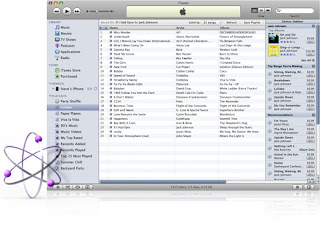 e college and album-oriented FM stations, late nights in Baltimore filled with smoke and rock music far removed from the mainstream confines of Anchorage AM stations.
e college and album-oriented FM stations, late nights in Baltimore filled with smoke and rock music far removed from the mainstream confines of Anchorage AM stations.Until recently, my music discovery followed roughly that same trajectory: from mainstream to personalized, evolving through eight-track tapes that let me hear what I wanted in our blue F-150 pickup, on to custom-made casettes from hipper friends introducing me to new sounds and finally to the apparent nirvana of the iPod. Apple's brillant marketing pitch said it all: 1,000 songs in your pocket.
But it turns out 1,000 songs won't do it – and neither will the nearly 6,000 I've collected since then. The fact is, I don't always know what I like, or what I want to listen to next. "Shuffle" doesn't work too well for me since my iTunes collection spans a wider range of styles than I ever want to hear in hodgepodge.
Welcome Pandora Radio and,
 more recently, the iTunes Genius playlist. Here are two new tools that combine the best of personalization with some much appreciated guidance and introduction to new music. Both use sophisticated algorithims to match my tastes in music with other songs I might like. Each can learn from my listening habits to fine-tune the selection.
more recently, the iTunes Genius playlist. Here are two new tools that combine the best of personalization with some much appreciated guidance and introduction to new music. Both use sophisticated algorithims to match my tastes in music with other songs I might like. Each can learn from my listening habits to fine-tune the selection.Pandora is in some ways more ambitious. It streams music constantly from its own collection based on matches with artists or songs I have previously selected. I can also vote thumbs-up or thumbs-down to teach it. I can't select specific congs (a licensing limitation) but in general the service does a good job in picking the tunes. Of course there's a quick way for me to click and buy those I like.
 The Genius feature on iTunes uses the music already in my collection to build new playlists based on any song I select. It has less to work with and isn't spot-on making matches, but it often reminds me of songs I own but rarely listen to, and the groupings are coherent and useful.
The Genius feature on iTunes uses the music already in my collection to build new playlists based on any song I select. It has less to work with and isn't spot-on making matches, but it often reminds me of songs I own but rarely listen to, and the groupings are coherent and useful.What does this have to do with the news business? Not a lot, I suppose, but it does make me think about the role we play in helping readers refine a bewildering selection of news and information down into a manageable "playlist" for any specific time. Human editors add value, as do the selection algorithims in Pandora or iTunes.
Readers once were stuck with whatever their newspaper picked for them – a lot like me listening to Scotty on KFQD all those years ago. When it became possible to aggregate our own selections, we entered an iPod age of news, where I built a list of RSS feeds and read just what I wanted.
But it feels to me like Pandora and Genius can trump the experience of listening only to my own collection. And I think smart, useful selection of news and information can do a better job for most of us than autodidactism.


Google reader already does a super basic version of the filtering/suggesting for you when you use it as your RSS reader. It will offer suggestions of other feeds that have similar content to ones you already read.
ReplyDeleteAlso Microsoft with their new Zune update added a feature like the I-Pod Genius feature that gives you not only related artists but also other users in their social network that have that artist as a favorite so you can start to explore based on others tastes.
But I agree, one person can only find so much on their own, if we were to improve our ability to analyze usage and slowly expand outward towards stories that have similar interests it could be a very good place for newspapers and media to head.
I surprised you didn't mention Slacker (http://www.slacker.com) as another great alternative. I recently discovered this site and love it. Similar idea to Pandora but way more genres to choose from, ability to make stations based on one artist or as many artists as you want and other settings to tweak like Popularity, Artist Discovery and Year. It also lets you request songs, heart or ban songs, ban artists and skip songs.
ReplyDeleteAnd, the best part is that they have a portable player that will let you take your stations wherever you go.
BTW - It's also free.